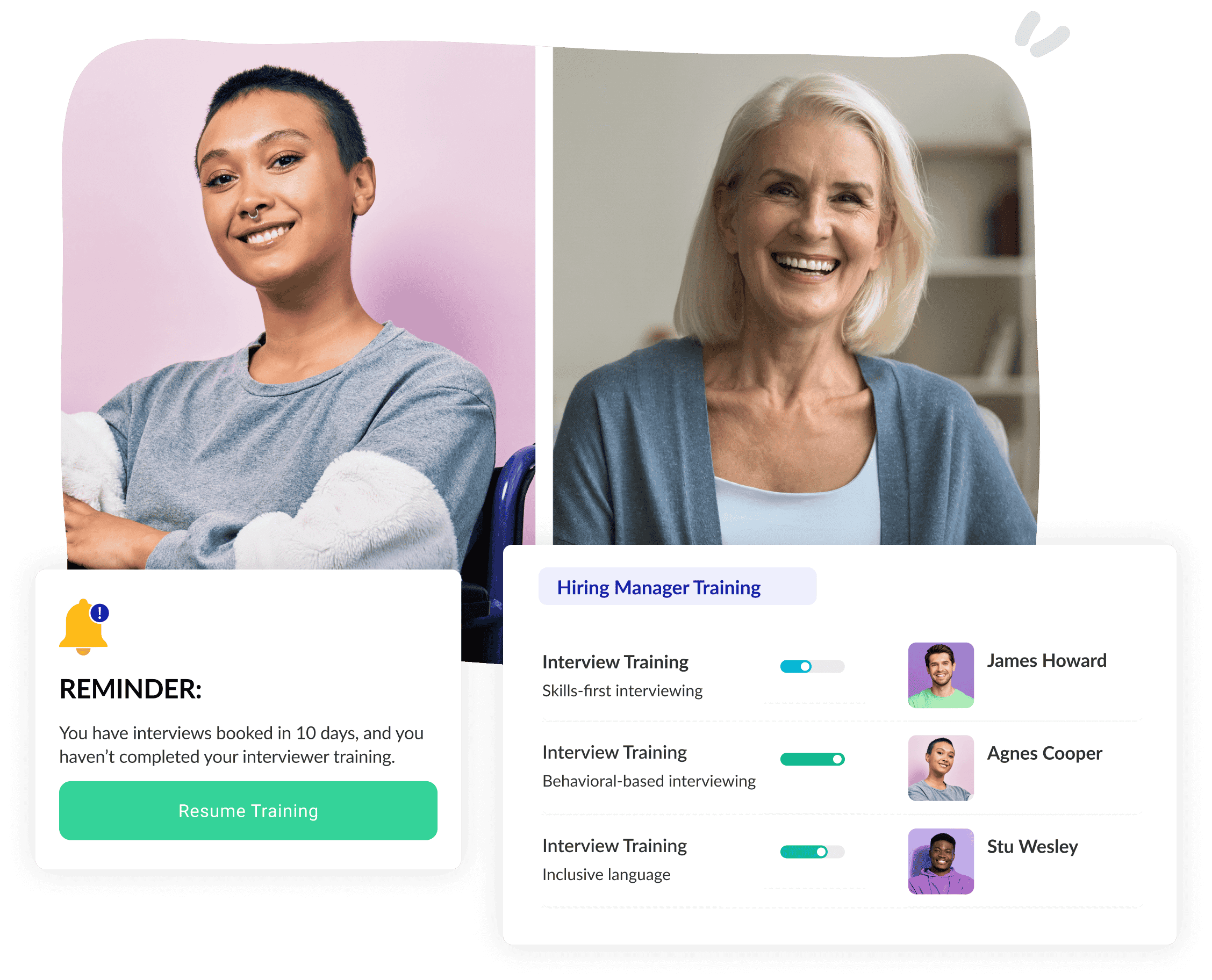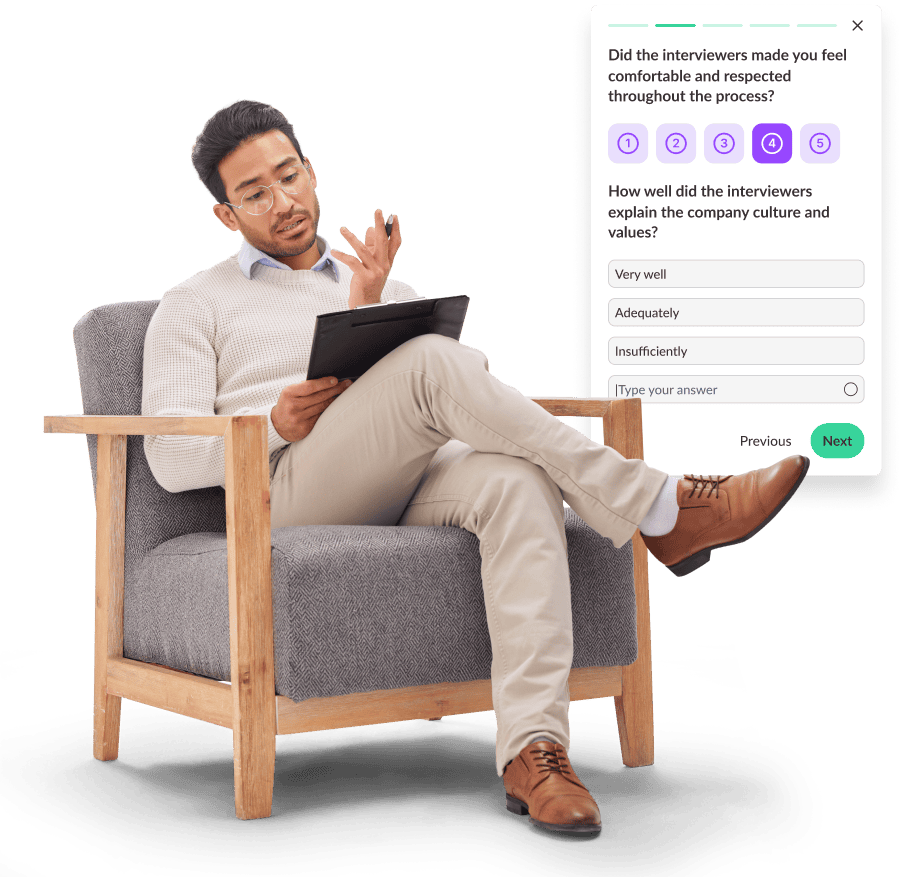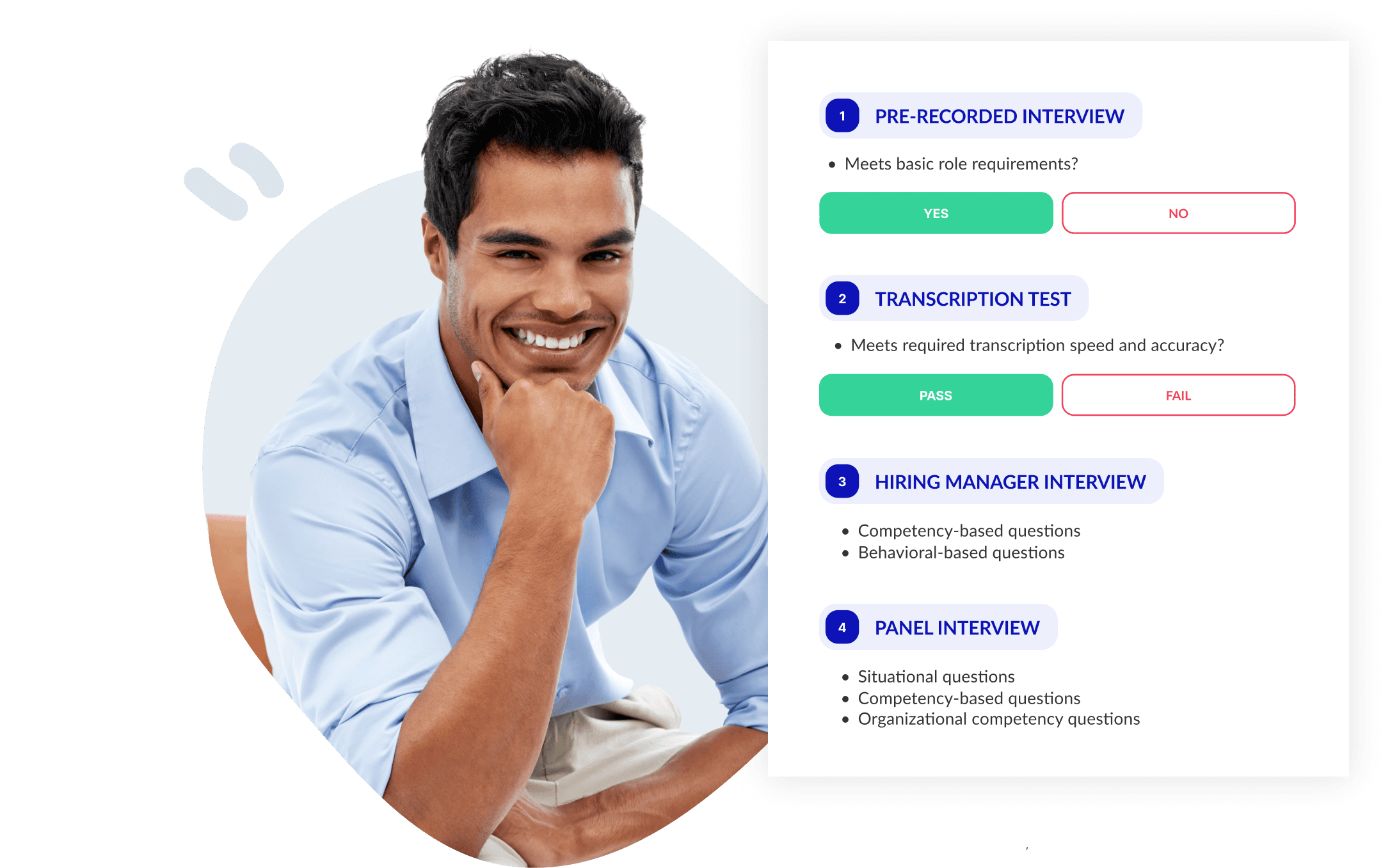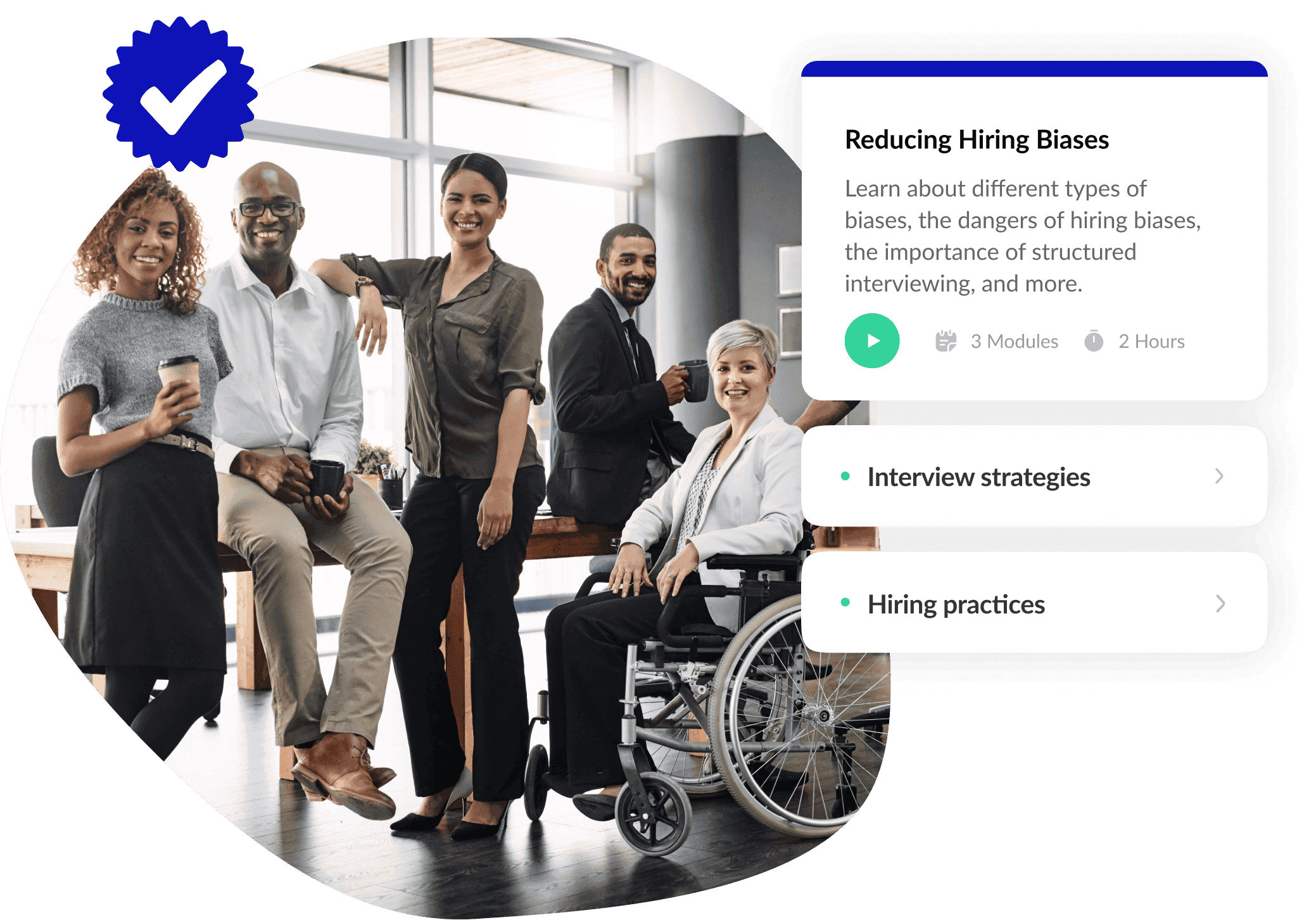
What Is Adverse Impact?
Learn how to calculate adverse impact and ensure fair hiring practices with our easy guide.

TL;DR: Interview Training for Hiring Managers
Interview training lays the foundation for effective and equitable interviews. HR teams can dramatically improve hiring practices across their organizations by teaching interviewers best practices and proven techniques, how to follow a structured interview process, and topics to avoid.
While organizations should invest in interview training to provide interviewers from every department, job level, and demographic with the tools and skills necessary to conduct effective and efficient interviews, hiring managers represent a critical audience.
This article explores what interview training for hiring managers entails, why it’s important, and how to develop and deliver interviewer training focused on fairness, compliance, and better hiring outcomes.
Interview training for hiring managers is designed to equip supervisors with the skills needed to conduct fair and effective interviews. Often part of a larger recruiter training program that includes courses on creating job descriptions and other steps in the hiring process, interview training focuses on topics like how to structure an interview, the types of questions to ask and avoid, and how to evaluate candidates.
A well-designed program encourages hiring managers to adopt best practices for interviews, which can enhance the candidate experience, improve the quality of hires, reduce the time to hire, and lower hiring costs.
Hiring managers directly impact an organization’s recruitment outcomes in many ways, including interviews, and there’s a lot at stake if they get the interview process wrong.
Consider this. It costs up to 40% of an employee’s base salary to hire someone new and provide them with benefits (Zippia). To put this in perspective, if the employee makes $30,000, it will cost approximately $12,000.
Empowering hiring managers with interview best practices reduces expenses related to hiring and costly turnover if the wrong candidate is selected.
In a Harris survey of 2,100 hiring managers, 1 in 5 admitted to asking an illegal interview question before they knew better. If a poor interview results in a lawsuit, it can cost the company financially and reputationally.
The best way to support legal defensibility and increase your success ratio is through interview training.

Consider including DEI training in your training program because it gives hiring managers the necessary skills and knowledge to interview properly and reduce the potential for bias. Unfortunately, it often gets skipped.
The benefits of interview training for hiring managers
Well-trained hiring managers…
Organizations launching a brand new recruiter training program may initially need to provide a mix of courses to various audiences, such as recruiters, hiring managers, and other employees who might be part of a hiring committee, to get everyone up to speed.
Ongoing interview training should include:
Every interview training program is unique because every organization has unique processes, considerations, and policies. The basic goal of interview skills training is to provide interviewers with the information they need to lead or participate in the interview process successfully.
Your answers to these four questions will help you structure interview training for hiring managers or other audiences:
1. What role does the interviewer play in the interview process, and what are they responsible for?
Creating checklists and explaining relevant policies is hard without knowing what you need them to do.
2. What do you want your interviewers to be able to execute independently, correctly, and consistently after interview training?
This might include logistical tasks, such as completing a digital interview scorecard or communicating decisions with candidates.
3. What core topics do you want interviewers to understand the importance of after training?
Foundational topics include candidate experience, hiring bias, structured interviewing, and legal considerations.
4. What interview best practices and techniques do you want to teach your interviewers?
Key concepts might include how to:
8 interview best practices for hiring managers
Regardless of what type of job interview you are conducting, here are eight interviewing tips that apply across the board.
Part of designing interview training for hiring managers and rolling it out across your organization involves determining the best way to deliver the content.
Will you offer training online, in person, or will it be a hybrid approach?
Will you offer separate courses by audience (e.g., recruiters vs. hiring managers), or will you combine sessions?
When and how often will you offer or conduct basic training, follow-up training, and refresher or remedial training?
The delivery method of your interviewer training will depend on various factors, including the size and location of your audience, as well as the topics covered. Common approaches to consider include:
Regardless of the method, the best recruiter training programs utilize feedback to improve continually. Send a survey after training to collect feedback and determine how often you will update the program (e.g., quarterly, annually).
Reviewing hiring managers’ interview performance can be another way to determine if your interview training is effective. Performance can be measured using interview intelligence tools, or you can monitor other metrics like candidate feedback scores, pass rates, Glassdoor reviews, and quality of hire.

Your interview training program should be unique to your organization and training goals. Here’s a list of things to consider covering in interview training, as well as some ideas on how to deliver this information in the interview training.
What is the hiring manager expected to do before and after the interview? Cover tasks in training they may have to complete. Include the directions and details elsewhere (in a training guide) so they can revisit if needed.
For example, a hiring manager may need to be involved in interview scheduling, or a job analysis might need to be done before the interview if it’s a unique position, but after the interview, there’s less work because someone else takes care of notifying the candidates, negotiation, and onboarding. The expectations will differ depending on the role and your organization’s interview process.
Since unstructured and semi-structured interviewing is common, most interviewers are used to having a lot of flexibility in interviews, so switching to structured interviewing might be a bigger challenge than they realize.
You’ll have to help interviewers unlearn their habits as they learn how to conduct structured interviews, where they’ll closely follow a pre-determined course of action. Standardization may feel counterintuitive because interviewers can no longer go with the flow and rely on their instincts like they used to, but it will improve hiring outcomes (Forbes).
Whether your organization already conducts structured interviews and you’re providing formal training for the first time, or you’re providing training as part of transitioning from unstructured to structured interviewing, you’ll want to start by emphasizing the ‘why.’ Show participants stats like these to get buy-in:
Structured interviews have the highest standalone predictive validity of all the tested interview tools (American Psychological Association).
A study in the International Journal of Selection and Assessment found that unstructured interviews were more frequently challenged in court than any other type of candidate selection device.
Research shows that a structured interview administered by a single interviewer has the same predictive validity as 3 or 4 unstructured interviews (American Psychological Association).
Provide hiring managers with a sample rating and interview guide, and describe how they will use each in detail. Once they understand the principles, mock interviews are a great tool to practice this interview format.
Send this in-depth guide to your hiring managers
Interview skills training for hiring managers should also provide them with strategies to avoid unintentional discrimination in the hiring process.
One approach is to make DEI training mandatory, either in addition to interview training or as part of it. DEI training teaches interviewers about a range of personal biases and how to avoid common pitfalls like making judgments based on intuition or selecting people based on cultural fit (which is a myth, according to TalentRise).
Following a structured interview process closely is also a reliable way for interviewers to treat everyone the same way and assess based on job-relevant competencies.

Hiring managers play a pivotal part throughout the hiring process, so recruitment training should also cover candidate experience. Explain why it is so important and share tips they can use to make candidates more comfortable while staying within the bounds of the interview process.
Collect feedback from candidates after the interview
How will you know how candidates feel about your organization’s interviewers and interview process without asking? External feedback is a powerful tool you can use to improve your interview training.
If you don’t collect candidate feedback, start with an anonymous survey that goes out after they finish an interview. Assure candidates that whatever they write will not be considered in the decision process.

Illegal interview questions can land your organization in hot water. Often, they are asked innocently to try to put the candidate at ease, but there are better ways to create a positive candidate experience.
Teach interviewers what to avoid asking or talking about and how to conduct structured interviews.
Structured interviewing is less risky than unstructured interviewing because the questions are all approved in advance and based on core competencies identified in the job analysis. The interview should not be discriminatory if the interviewer follows the guide closely.
Below are some illegal interview topics to highlight in interviewer training, along with some tactics to support interviewers with legal compliance.
DO
DON’T
Have a DEI expert and I/O psychologist validate the interview questions and rating guide in advance. This makes the interview more inclusive and prevents illegal interview questions or biased language from making it to the interview.
Teach interviewers how to handle volunteered information. The best practice is to avoid pursuing that line of discussion, documenting the information in the interview notes, or considering it when they rate the candidate and make selection decisions.
Discuss or ask about:
A critical component of interview skills training for hiring managers is teaching them best practices for capturing and sharing their opinions about candidates. Poor interview documentation can create issues, especially if someone files a complaint and there are no notes or records of their interview.
Ensure that managers receive training on how to evaluate applicants fairly and consistently. Interview scorecards enable interviewers to objectively assess candidates’ suitability for a position based on predetermined criteria and competencies.
Additionally, if you don’t already have one, create a policy around interview documentation to outline rules around taking notes, remind interviewers they are discoverable, and prevent people from capturing irrelevant information. Quiz hiring managers on this policy after training them on it.

Give hiring managers all the training and support they need to effectively use your organization’s chosen hiring platform for interviewing. If necessary, illustrate how it integrates with your organization’s applicant tracking system.
Get them comfortable with the digital version of your interview workflow, and make sure they know how to navigate the digital interview guide and how to fill out and submit a candidate scorecard.
There could be a steep learning curve, especially for interviewers uncomfortable with technology. See if the vendor can support you by offering interview platform training or training guides to your hiring managers.
According to the Association for Talent Development, Diversity, Equity, and Inclusion (DEI) training helps “workplaces become more diverse, equitable, and inclusive, particularly for employees from underrepresented or historically marginalized communities.”
There are subtypes of DEI training that educate employees in different ways and influence how they behave, including a type specifically focused on hiring and interviewing. This type of DEI training benefits all staff involved in hiring.
In DEI training for hiring, participants learn a variety of things, including (but not limited to):
DEI training is important for interviewers because it minimizes the impact of hiring biases on ratings, helps prevent unintentional discrimination, and supports greater organizational efforts to prioritize DEI.

Take Harvard’s Implicit Association Test (IAT)
Hiring managers can take an IAT as part of DEI or interview training. These tests detect the strength of subconscious associations between concepts in your memory, and the results help create self-awareness.
Educating people about bias isn’t enough to prevent bias, but it’s a solid first step. Harvard’s IAT (Project Implicit) is a free option to take advantage of.

Hiring platforms, specifically those equipped with interview intelligence, increase transparency and provide AI insights about interviewer performance within the video interviewing platform.
Here are some ways you can leverage this technology to elevate interviewer training and performance.
Interview Software
Interview Intelligence
Remind Interviewers About Implicit Bias
At the beginning of every interview, create a reminder in the platform covering different types of bias to watch out for. Explain why a reminder like this is essential in training, and make interviewers confirm they’ve read it and understood it.
Enable Continuous Learning
With interview intelligence, there’s no end point for interviewer growth. AI can provide ongoing coaching and monitor trends over time, providing insights and allowing you to step in and offer additional support if needed.
Rewatch Interview Recordings
Easy access to all the video or hybrid interview recordings allows you to watch back interviews as if you were in the room, increasing accountability around following the rules and policies set out in training.
On The Spot Feedback
More advanced interview intelligence offers real-time feedback on things like talk-time ratios, so interviewers have the opportunity to correct their behavior immediately.
Track Interviewer Performance
Is interview compliance high or low? Determine if interviewers use what they learned in their initial training to conduct better interviews.
Produce Individualized Training Plans
AI interviewer analysis can send you feedback on interviewer performance, enabling you to produce individualized training plans to address areas of improvement.
While DEI sensitivity training can be conducted simultaneously across departments, interview training should be tailored to specific roles if recruiters and hiring managers have distinct responsibilities. As a best practice, all personnel involved in hiring, from recruitment to selection, should at least receive general interview training.
Not for all employees. Only those who are related to or will be related to the hiring process in the future should receive some form of interviewer training.
Behavioral interview training for hiring managers focuses specifically on the types of questions asked. Unlike standard training, this method centers on the candidates' past actions to gain an understanding of their professional behavior. It aims to predict a candidate’s future performance by assessing their core competencies through their previous behaviors.
Offer structured interview training for hiring managers that covers best practices, legal considerations, bias reduction, and candidate experience. Consider including a mix of live instruction, mock interviews, and digital guides to reinforce interview skills training.
Interview training for managers should include structured interviewing, legal compliance, hiring bias, candidate evaluation, interview documentation, DEI training, and how to use your interview platform.
Use metrics such as candidate experience feedback, quality of hire, Glassdoor reviews, pass rates, and interview intelligence data to evaluate the effectiveness of interviewer training.
Interviewers should receive initial training and periodic refresher courses on specific topics, such as legal and compliance issues. Review and update your interview training program regularly (e.g., quarterly or annually) based on trainee feedback, changes in hiring practices, or if performance metrics, such as candidate feedback scores, are below expectations.
A good interviewer creates a positive candidate experience, follows structured processes, avoids bias, asks questions that are relevant to the job (and legal), and evaluates candidates fairly and consistently.
Common mistakes include relying on intuition, inadvertently asking illegal questions, skipping preparation, or ignoring structured interview best practices—all of which can lead to poor hiring outcomes and legal risk.
Modernize your hiring process with expert insights and advice.